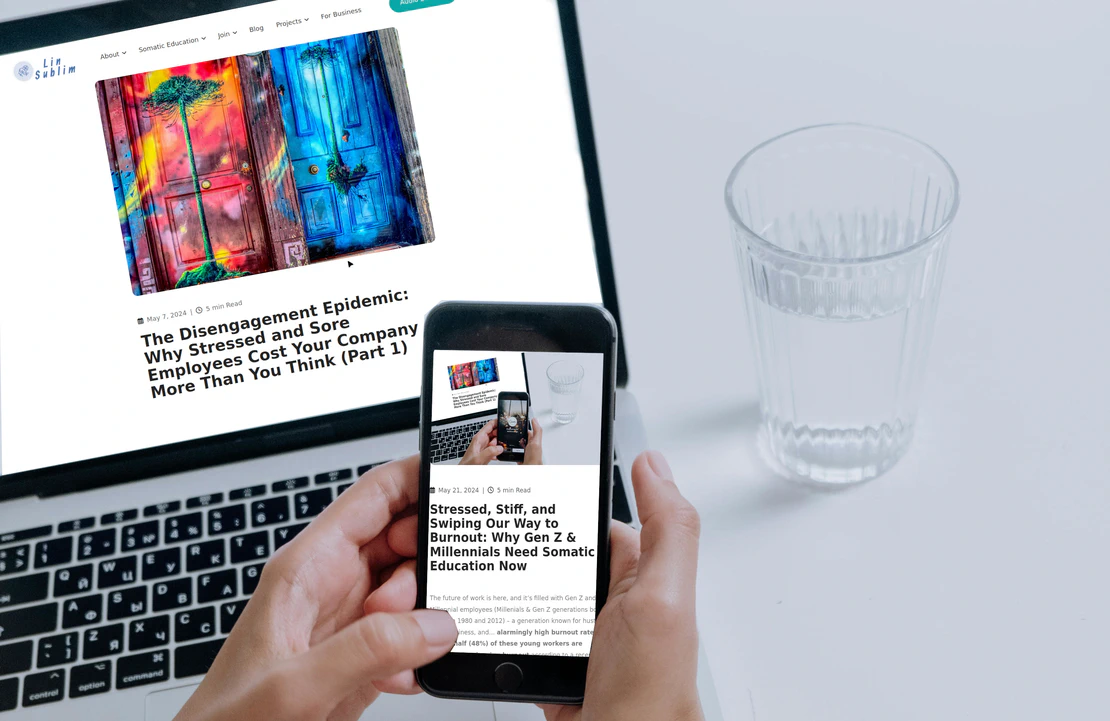Stressed, Stiff, and Swiping Our Way to Burnout: Why Gen Z & Millennials Need Somatic Education Now

Published at: 2024-05-21
The future of work is here, and it's filled with Gen Z and Millennial employees (Millenials & Gen Z generations born between 1980 and 2012) – a generation known for hustle, tech-savviness, and... alarmingly high burnout rates. Nearly half (48%) of these young workers are already experiencing burnout according to a recent study. 1
Burnout leads to a myriad of other issues such as depression and chronic pain in a never-ending vicious cycle of increasing healthcare and business costs.
The U.S. economy loses an estimated $500 billion due to workplace stress per year 2 3. Absenteeism and lost productivity due to depression cost the U.S. $51 billion annually. 4
This isn't just a productivity issue; it's a wake-up call for the way we approach well-being in the modern workplace.
Why are young people burning out so fast? Let's face it, entering the workforce these days can be a pressure cooker. 5 Competition is fierce, deadlines are tight, and the lines between work and personal life are often blurred by technology. But there's another culprit lurking in the shadows: our bodies.
Enter the Age of Bad Posture and Text Neck:
Gen Z and Millennials are the first generation to grow up with constant mobile phone access. Hours spent hunched over screens have led to a rampancy of bad movement patterns, chronic tension, and pain. 6 These physical imbalances contribute to stress, fatigue, depression7 and reduced focus – all factors accelerating the burnout cycle.8
Early Onset: Nearly Half of Millennials Already Have Chronic Conditions
44% of older millenials already have a chronic health condition 9 which is impacting their wellbeing, productivity and lives.
X-rays of GenZ and Millenials demonstrate visible musculoskeletal changes due to bad posture and "text neck".10
Effectively, their nervous systems internalize the bad posture which leads to pain, tension and even negative musculoskeletal adaptation.
Prioritizing Well-being: A Shift in Workplace Values
A stark generational divide is emerging when it comes to employee priorities. Recent surveys indicate that Gen Z and Millennials place employee well-being 11 at the top of their list when evaluating potential employers. This focus on well-being surpasses even ethical leadership, which holds a strong second place. Notably, previous generations often prioritized ethical conduct and financial stability as their top concerns. This shift in priorities underscores the growing importance of a healthy work environment for younger generations entering the workforce.
Here's the good news: there's a powerful solution.
LinSublim's somatic education offers a lifeline for stressed-out, tech-dependent bodies. This gentle, introspective approach to movement helps you reconnect with your body and address the physical roots of stress and pain.
Through mindful movement practices such as LinSublim you can rewire your nervous system and brain's neuroplasticity to foster beneficial changes such as:
- Reduce tension built up from hours of texting and sitting. 12
- Improve posture and alignment for a pain-free body.
- Boost energy levels and feel more invigorated throughout the day.12
- Enhance focus and concentration for peak performance. 12
- Develop self-awareness and tools to manage stress effectively. 12
- Eliberate anyone from the grips of anxiety13
Programs like LinSublim provide a convenient and accessible way to integrate somatic education into your life. With online audio lessons and curated learning collections, you can learn effective practices anytime, anywhere.
Investing in somatic education isn't a luxury; it's a necessity for the future of work. Equipping Gen Z and Millennial employees with these tools helps them build resilience, improve well-being, and thrive in a demanding world. It's time to break free from the cycle of stress and burnout. Let's move smarter, not harder, and unlock our full potential together.
Ready to learn more? Join LinSublim today and discover how somatic education can empower you to conquer stress and build a brighter, healthier work future.
Reduce Absenteeism & Boost Productivity: Learn How LinSublim Can Help
Photo by cottonbro studio: https://www.pexels.com/photo/person-holding-a-smartphone-5077051/
-
Burnout is on the rise worldwide—and Gen Z, young millennials and women are the most stressed https://www.cnbc.com/2023/03/14/burnout-is-on-the-rise-gen-z-millennials-and-women-are-the-most-stressed.html ↩︎
-
Financial Costs of Job Stress https://www.uml.edu/research/cph-new/worker/stress-at-work/financial-costs.aspx ↩︎
-
Workplace Stress https://www.stress.org/workplace-stress ↩︎
-
Burnout stats https://thrivemyway.com/burnout-stats/ ↩︎
-
Gen Z adults and younger millennials are “completely overwhelmed” by stress https://www.apa.org/topics/stress/generation-z-millennials-young-adults-worries ↩︎
-
The prevalence of bad posture and musculoskeletal symptoms originating from the use of gadgets as an impact of the work from home program of the university community https://www.ncbi.nlm.nih.gov/pmc/articles/PMC9556879/ ↩︎
-
Carissa Wilkes, Rob Kydd, Mark Sagar, Elizabeth Broadbent, Upright posture improves affect and fatigue in people with depressive symptoms, Journal of Behavior Therapy and Experimental Psychiatry, Volume 54, 2017, Pages 143-149, ISSN 0005-7916, https://doi.org/10.1016/j.jbtep.2016.07.015. (https://www.sciencedirect.com/science/article/pii/S0005791616301719) ↩︎
-
Cramer H, Mehling WE, Saha FJ, Dobos G, Lauche R. Postural awareness and its relation to pain: validation of an innovative instrument measuring awareness of body posture in patients with chronic pain. BMC Musculoskelet Disord. 2018 Apr 6;19(1):109. doi: 10.1186/s12891-018-2031-9. PMID: 29625603; PMCID: PMC5889545. https://www.ncbi.nlm.nih.gov/pmc/articles/PMC5889545/ ↩︎
-
44% of older millennials already have a chronic health condition. Here’s what that means for their futures https://www.cnbc.com/2021/05/04/older-millennials-chronic-health-conditions.html ↩︎
-
Gen Z and Millennials are turning into ‘old, hunched over people’, doctor claims https://www.news.com.au/lifestyle/health/health-problems/gen-z-and-millennials-are-turning-into-old-hunched-over-people-doctor-claims/news-story/906b3b71e49afd4fbb6ae0af5a5fb185 ↩︎
-
4 Things Gen Z and Millennials Expect From Their Workplace https://www.gallup.com/workplace/336275/things-gen-millennials-expect-workplace.aspx ↩︎
-
Mehling, W.E., Wrubel, J., Daubenmier, J.J. et al. Body Awareness: a phenomenological inquiry into the common ground of mind-body therapies. Philos Ethics Humanit Med 6, 6 (2011). https://doi.org/10.1186/1747-5341-6-6 ↩︎ ↩︎ ↩︎ ↩︎
-
Kolt GS, McConville JC: The effects of a Feldenkrais Awareness Through Movement program on state anxiety. Journal of Bodywork and Movement Therapy. 2000, 4 (3): 216-220. 10.1054/jbmt.2000.0179. 10.1054/jbmt.2000.0179 ↩︎